
+ The Story Table takes a theme from FULLER magazine and brings it to life at everyone’s favorite conversation place: the dinner table. People who embody the theme in unique ways tell their stories around the table, and members of the community are invited to listen in. The first Story Table focused on women in ministry, and were honored to host among our guests faculty, students, grads, our first female dean, and others to reflect together. The Office of Women’s Concerns was established at Fuller in the 70s after women students staged a sit-in at the provost’s office, demanding representation on campus. The first director resulting from that activism was also at the table with us—and what stories were told! If you are interested in hosting your own Story Table, we’ve prepared a guide that you might find helpful. Download our Story Table Guide.
Guests:
Mari Clements, First Female Dean of the School of Psychology
Leah Fortson, Clinical Psychology PhD Student and Preacher
Julie Kang, Director of All-Seminary Chapel
Libbie Patterson, First Director of the Office of Women’s Concerns
Lisseth Rojas-Flores, Associate Professor of Marriage and Family Therapy
Meritt Sawyer, Fuller Trustee and Executive Director for the Paul Carlson Partnership
Marianne Meye Thompson, Professor of New Testament
Michael Wright, Associate Editor: My name is Michael. I’m associate editor of the magazine. I want to read a few quotes so we kind of get a sense of the deeper purpose of why we’re telling stories around this table tonight.
“They have secrets hidden up their sleeves that they might reveal and be found a common language. I find that I can love nature no matter how distant individual organisms are from me, but I reach out and hope that I can shorten the distance and create some feeling of coexistence.” I heard that the other night, and it’s from an entomologist talking about bugs.
[laughter]
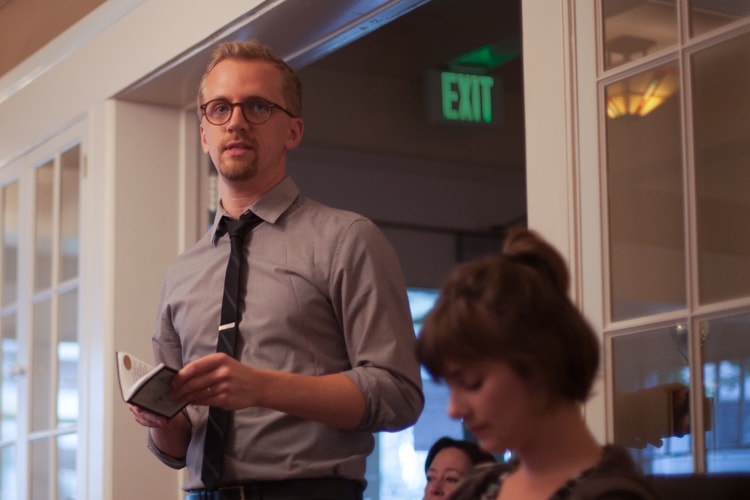
He loves bugs so much he wants to shorten the distance between the subjects that he studies by finding common language, and I was really struck by it. I started tearing up and I’m like, “I don’t care about bugs, why am I tearing up about this?” I think it’s that shortening the distance between people.
The stories in the magazine are not just something that we’re trying to throw away when we’re done but something that really creates and fosters conversation, creates space for change and momentum to happen on our campus. In the words of someone much more important, this is Matthew 13, from The Message:
“Why tell stories?” The disciples asked Christ. And he replied, “You’ve been given insight into God’s kingdom. You know how it works. Not everybody has this gift or this insight. It hasn’t been given to them. Whenever someone has a ready heart for this, the insights and understandings flow through me. But if there’s no readiness, any trace of receptivity soon disappears. So that’s why I tell stories, to create readiness and to nudge the people toward receptive insight.”
Our hope as FULLER magazine is that these stories will nudge us ever so closely towards deeper hope and receptive insight. Thank you all for being here. Becky’s going to pray for us and we’ll begin.
Becky Still, Senior Editorial Manager: Dear Jesus, I thank you so much for this time and this space that has been set aside for sharing stories, Lord. I think each one of us here is aware of how powerful stories are, that they really have the power to change us and I pray that would be so tonight as we listen in to this amazing group of women gathered around the table.
I lift up each one of them to you, these women at the table as they share of themselves. I pray that they would feel affirmed by you and by us as they share openly, deeply, and vulnerably from their hearts about their particular journeys, their griefs, their joys, their wounds, their healings, and their individual journeys as women. As they also share the ways that they’ve seen You along the road, and the ways that maybe they’ve been challenged to see you.
I pray you would be with each one of us as we listen in, that You would give us open hearts to receive what they say and let it change us as You would want it to change us. I pray that You would not only help us to be changed, but to through this experience, move a little closer toward becoming the agents of change and transformation that You would want each of us to be in each of our individual’s spheres as we live and move and have our being.
Lord, I thank you for each person that’s present here tonight. I thank You for this opportunity. Thank You for the stories You give each of us to live and tell. I thank You for this community where we can grow through the sharing of them. I ask all these things in Your precious son’s name. Amen.
Congregation: Amen.
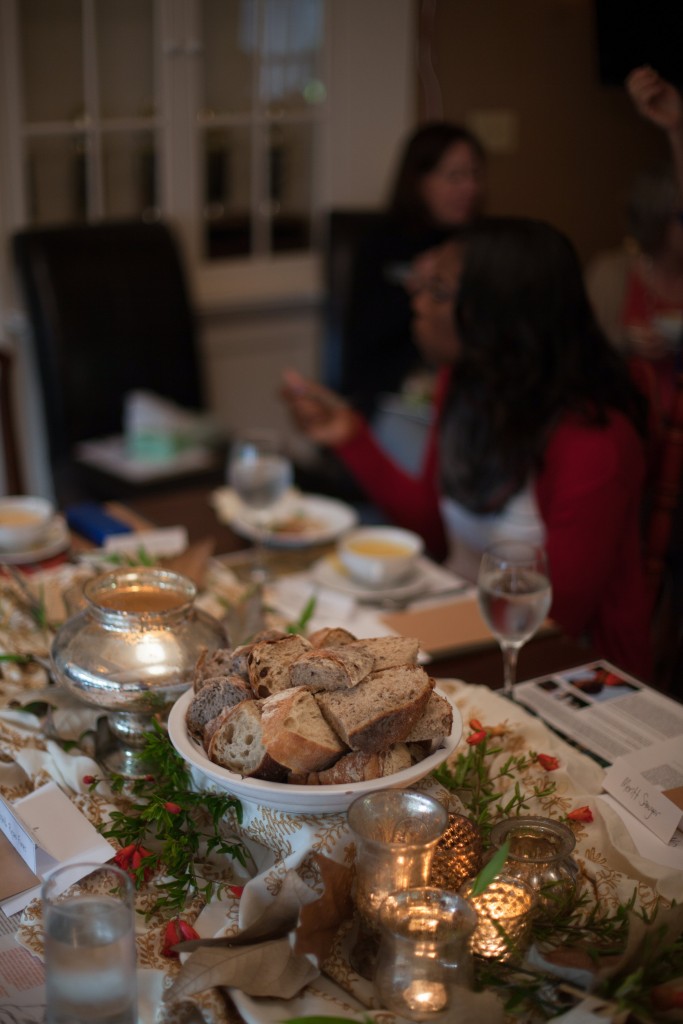 Lauralee Farrer, Chief Creative: A couple comments for everyone and then, I’m going to talk to you at the table and everyone else can listen in if they like. . . . How many of you have memories of the Catalyst that are older than just the last 15 minutes?
Lauralee Farrer, Chief Creative: A couple comments for everyone and then, I’m going to talk to you at the table and everyone else can listen in if they like. . . . How many of you have memories of the Catalyst that are older than just the last 15 minutes?
[laughter]
This building is like a vessel that carries our memories and it has a lot of history of Fuller in it. If that feels a little hookie‑dookie to you, all I mean is there are many of us who can just walk in the door and be reminded of something potent enough to stop our breath—especially if it’s been a long time since you’ve been in here. You can think, “Wow, I remember the conversation I had over there in that corner. That conversation changed my life.”
This is my table. By which I do not mean I’m the boss. This is actually my table from my living room. Some of these chairs are mine and some belong to others in the room. Dean of Chapel Laura Harbert and staff member Lindsey Wright made dessert and Victoria Smith brought table decorations from her home, and Managing Editor TJ Lee and I made the flower arrangements from the yard.
There is something of value when you make food with your own hands and you take flowers from the yard that is your own. We wanted to reinforce that, believing that it would add value to the process for us, hence the homemade desserts and especially the soups from Lalo across the way including the butternut squash we have at every faculty editorial meeting.
All of it is lovingly and intentionally chosen as a way of saying, “Come to the table. Let’s remember who we are with each other and in the belief that those things have value as vessels of conversation and of story and memories.”
One of the reasons that you women in particular are around the table, is that the upcoming Spring 2015 magazine theology section focuses on women—with guest editors Marianne and John Thompson, who are both here tonight. We illustrated that section with female “firsts” of Fuller: the first faculty, trustee, student, grad, leadership on campus. We thought it would be interesting to have around the table the forbears of those women—which explains why we have faculty, trustee, student and, in fact, the whole arc of our history of female deans is right here at the table!
[laughter]
Mari Clements: No pressure.
Lauralee: One of the women we highlight in the magazine is Libbie Patterson, who was the first Director of the Office of Women’s Concerns back in 1976. We are really thrilled to have Libbie here tonight! So, anything I say that isn’t quite on the nose, feel free to speak up and say, “That’s not exactly how it happened.”
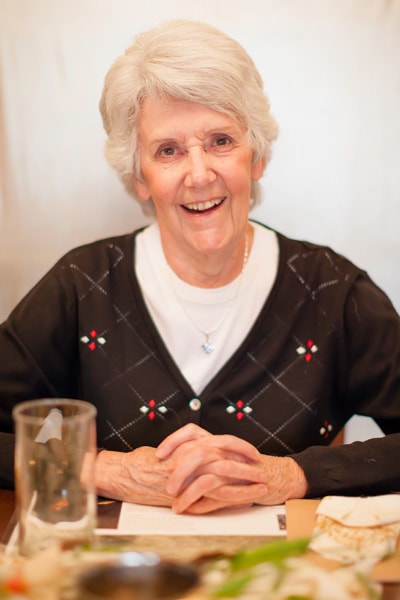 Libbie Patterson: Oh my goodness.
Libbie Patterson: Oh my goodness.
[laughter]
Lauralee: We should not shy away from talking about the painful things about being women leaders in a world shaped by and for men. We should not avoid that. I also want to be sure that our conversation includes our feelings of encouragement and how we feel we should and can move forward.
Meritt, if I can start with you. Talk about what it’s like for you to be a woman on the board of trustees—you can dig as deep into that as you want to—and tell us why you think it’s important for female voices to be involved there.
Meritt Sawyer: I have to say, I don’t necessarily think of myself specifically as a woman on the board of trustees. It’s a privilege to be able to serve. I’ve been there now about 12 years. We’ve seen a lot of growth, a lot of change. I have an opportunity to give voice there and we have seen growth of the female population. I certainly would want to see more representation on the board and have a chance to be more sensitive to what women experience on campus—also thinking about placement for women after their experience here.
Meritt Sawyer, Fuller trustee and president and Executive Director for the Paul Carlson Partnership
That is what I find most challenging. We know that there are challenges for women to be placed particularly as pastors in churches. What are the ways that we can be thinking of ourselves as advocates with that?
I can’t say that when I sit in a board meeting I even really think of myself as a man or a woman. We’re developing a great sense of community, there is a great sense of fellowship there and a great sense that we need to be about the business of the institution.
There were a number of women that had come on the board before me and would love to see more women there and also a great generational kind of representation as well. I do feel like women have gone before me and I have felt very much respected, I have felt my voice has been heard throughout the time there.
Lauralee: That’s encouraging to hear. Libbie, tell a little bit about what that was like for you in the beginning.
Libbie: Gosh. When I first came I was told by more than one person, “Everyone’s watching you, you know. To make sure that women are okay.” There were very few women—22 or something, the year I came. One of the people at this table was one of those students!
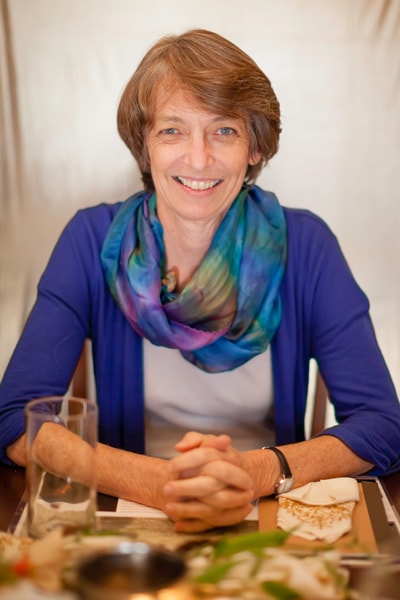 Marianne Meye Thompson: It’s a few years ago.
Marianne Meye Thompson: It’s a few years ago.
[laughter]
Libbie: Bill Pannell [first African American faculty and trustee member] found me early on and he said, “We’ll talk.” He was great. We both found common cause with each other. We used to say, as if we were competing: “You’re going to get there before we do” meaning African Americans will get there before women, or women will get there before African Americans.
Lauralee: What brought you to Fuller in the first place?
Libbie: I was in Seattle. I’d never been to Southern California. I used to say there were three places I never wanted to live and Los Angeles was number one on that list. I got a phone call in the spring of 1976 that the women at Fuller Seminary had a sit-in at the provost’s office [demanding an office of women’s concerns]. The provost back then was Glen Barker. They basically said, “We’re going to stay here until you bring somebody to represent women at Fuller.” Roberta Hestenes and Jack Rogers both knew me from Seattle, from the Fuller regional campus. I had a background in Career Development and one of the main concerns was that women wouldn’t get jobs after seminary, so they wanted somebody with a background like mine.
Meritt: Still an issue!
Libbie: When they brought me down, I had a job offer in Seattle that I was considering seriously. It was the most bizarre thing—I have never had anything like this happen since in my life. When I got here, it was as if I was already here. I recognized the job. I knew it was for me. I cried on the plane on my way home because I didn’t want to do it. I had deep roots in Seattle. But it was just clear that this was it.
Lauralee: May I just say God bless you and thank you for making that choice all those years ago.
Libbie: OK. I wanted to say that from that group that held the sit‑in came a dean of another seminary, pastors, a bunch of women faculty. It was a pretty high level group of women. By the way, originally they called it the Office of Women’s Affairs.
[laughter]
Libbie: That’s it. So, we changed the name to Office of Women’s Concerns.
[laughter]
Libbie: Fuller’s always been feisty.
Lauralee: Marianne, what do you remember about that time?
Marianne: I came as a student in ’75. These houses that we are sitting in were all dorms. Next door was called Dorm 150. It had 12 guys and my roommate and me. John [her husband-to-be] lived downstairs in what is now the CAT’s Examination Room. I had come from Wheaton College where we didn’t even have co-ed visitation on the floors.
[laughter]
Marianne: So I walked over into this building and there were men’s voices! I turned around, went out, went back to the Housing Office to question this. The Housing Office, by the way, consisted of a couple who gave me the keys to the building. I said, “I think you’ve given me the wrong keys. There are men in this house.” They said, “Yeah. That’s the way we do it.” And I said, “OK.”
[laughter]
Libbie: That is how Marianne and John met!
Lauralee: So it worked!
Marianne: There are many stories from Dorm 150.
Lauralee: Sounds like a sitcom.
[laughs]
Audience member: I’d watch that!
[laughter]
Marianne: Back in those days we all ate in the refectory together. It was a little community on campus of a couple hundred? We had breakfast together and lunch together and then at dinner time those of us who lived on campus ate together, too. There was a very different feel. I’d be in a class of 50 or 60 and there would be maybe one other woman. It was very different. As a woman, you were quite noticable on campus.
Lauralee: What was it like to be in a context where you were among people who disagreed with your right to be there?
Marianne: I know they were there and I know other women have had this experience, but I never had anyone say to my face, or to me, “You shouldn’t be here.” So if they said it, they never ever said it to me personally. I don’t know why they never said it to my face, but they didn’t.
Marianne Meye Thompson, Professor of New Testament
John Thompson [from the audience]: I know why!
Marianne: Why?
John: Because you would have whupped their butts in Greek!
Marianne: Oh. Well, there’s that. [pause.] It’s a nasty business but someone’s got to do it.
[laughter]
Libbie: There was one student back then who was stopped on campus by a man who looked her up and down and said, “I just wanted to see what the competition looks like.” That was not an unusual thing.
Marianne: Yeah.
Lauralee: It’s a lot of weight, people openly saying to you, “We’re watching you.” I have no doubt that everyone at the table brings a certain set of experiences that reverberate off of these themes. Leah, talk a little bit about being a preacher.
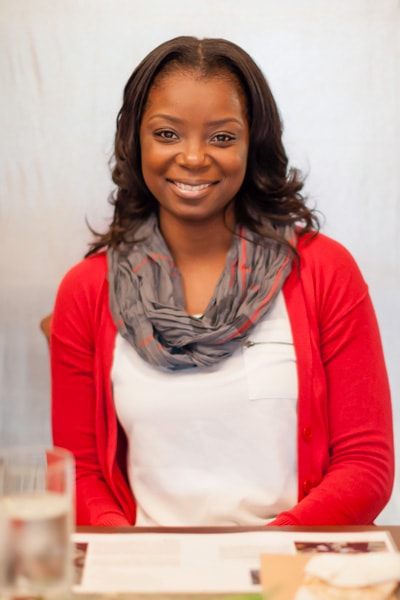 Leah Fortson: That’s a broad question because I’m a preacher in various contexts. I think if I speak to my personal context, it’d mean part of an African—American Pentecostal Charismatic Church, it’s very different. Although there have been a lot of advances with women in that particular tradition, you do standout still. If I speak on the negative end of things, I have been in settings where I have been invited to preach and none of the men will speak to me. I have been in church services where I have been asked to preach but given a lower podium.
Leah Fortson: That’s a broad question because I’m a preacher in various contexts. I think if I speak to my personal context, it’d mean part of an African—American Pentecostal Charismatic Church, it’s very different. Although there have been a lot of advances with women in that particular tradition, you do standout still. If I speak on the negative end of things, I have been in settings where I have been invited to preach and none of the men will speak to me. I have been in church services where I have been asked to preach but given a lower podium.
Lauralee: Oh, really? A lower podium? Wow.
Leah: On the other side, I’ve also been affirmed in my tradition. I received my call to the ministry in my tradition, and I’ve been given opportunities to minister, so there is an extreme dichotomy there.
At Fuller, however, I felt very much appreciated—though I didn’t expect to. But I recall, just last year, in my first preaching class with Dr. Carolyn Gordon and I was at a stage in my ministry when I was feeling very disheartened and really wanting to take a back seat to ministry.
I recall being in that class and being brought to tears on several occasions. Just feeling that passion to preach reawakened in me and it was a male teaching assistant [TA] in that class that told me, “Leah, I don’t know what people around you have said to you, but you are called to preach. I don’t care where you go or what happens in your life, don’t stop preaching.”
I was brought to tears sitting there with that TA. I think it’s a great example of how you come in different settings and different contexts. People that you least except to speak into you reawaken certain passions within you—they are the ones that God sends. It meant so much more to hear that person say that to me than anyone in my context could have.
Lauralee: This is really a lesson to us to speak those encouragements aloud. Not just think wow, that person really has a gift. Go out of your way to speak the word, to speak it out. Cross the distance.
Leah: Absolutely, I hear all the time, “Oh, you are a great preacher,” and every time people say it, I say “Really?” I think a lot of people expect you to know what you are. To really believe or to feel that you are what they see. When often the image that they see is not the one I see in the mirror.
When we speak what we see in people it holds so much power. I think it is our responsibility, as brother and sisters in Christ, is to speak what we see to uplift to encourage and to empower each other.
Lauralee: Let me ask, when you said you didn’t except to come to Fuller and have that kind of reception. Why did you feel that way? And what was it made you think, “Oh, it’s going to be more receptive than I realized.”
Leah: One of the primary reasons I chose Fuller was the cofounder of my church attended here. She is now 82 years old. She attended Fuller when it was a very different place and she is an African American woman. Just hearing her experience it made me think, “Well, I don’t know what my experiences would be.”
I also was aware my church tradition is not necessarily as represented here. I didn’t know how I would be received in that regard either. Fuller is, of course, known to be somewhat liberal in evangelical circles, and my tradition is very conservative.
[laughter]
Lauralee: Here we go! Julie, what has your experience been?
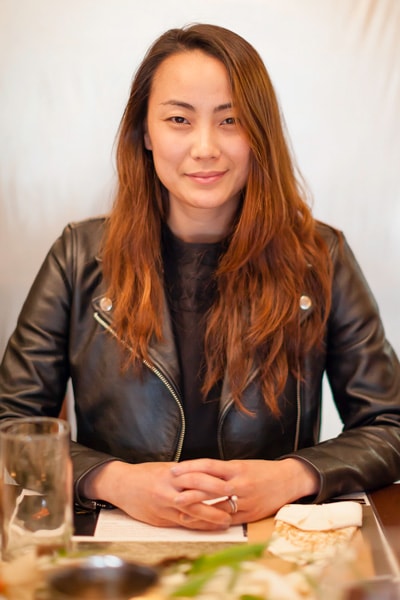 Julie Kang: I got a lot of backlash coming here. It was just a mix of things—I didn’t really know what to expect, I didn’t expect it to be as affirming as it has been for me. I’ve had mixed experiences. I would say Fuller has been more at the affirming end of me being a worship leader and a woman and a minority. So I had wonderful experiences here at Fuller. I don’t know if that’s the case for every other context that I’ve been part of. I’ve grown up in a lot of American situations and contacts and a lot of immigrant churches where the whole gender thing is a still hot issue.
Julie Kang: I got a lot of backlash coming here. It was just a mix of things—I didn’t really know what to expect, I didn’t expect it to be as affirming as it has been for me. I’ve had mixed experiences. I would say Fuller has been more at the affirming end of me being a worship leader and a woman and a minority. So I had wonderful experiences here at Fuller. I don’t know if that’s the case for every other context that I’ve been part of. I’ve grown up in a lot of American situations and contacts and a lot of immigrant churches where the whole gender thing is a still hot issue.
It’s been a pretty mixed bag of experiences. I’ve been in situations where it was thought that a female vocalist should always be back-up to a male leader. I’ve also had experiences where I would apply for a worship director or worship pastor position and have been offered a children’s ministry or nursery ministry as a substitute. As their idea of something more fitting position for me. [long pause] It is not.
[laughter]
Julie: Just to be clear. Also on the other end, I’ve led worship in spaces where I felt so affirmed by the pastor, by the congregants, and the people that I worked with. I’ve been fortunate here at Fuller to work in the chapel team where we wrestle with these things.
We’re very conscious of balancing out the amount of women that are a part of our team, the amount of minorities that are a part of it—we are doing our best to do that. That’s been a very affirming situation for me and actually very redeeming. I have the privilege of working with amazing, amazing worship leaders, musicians, and artists that come and support me as a worship leader. I don’t think that’s a situation that a lot of my friends get to have. Fuller’s been edifying for me.
Julie Kang, Fuller alumna and chapel worship leader
So, I have this spectrum. But some of my most painful experiences have come from men that have told me otherwise.
I’ve been told before that [one of the reasons a female voice cannot lead is that] the female vocal is a harsh thing to listen to [laughs] as opposed to a male vocal. The preference, therefore, is to have a male sing lead, or for a woman to take a step back, because the higher pitch of a woman’s voice is not pleasant to the ears.
[laughter]
That’s something I can’t change. I can’t be a baritone by tomorrow. So there’s nothing I can do. So, there have been situations where it felt like there was absolutely no place for me in the worship leadership, in the ministry. No place for me except kitchen work, or nursery, or children’s ministry. This is not just in my Korean immigrant church context either.
Various voices: Oh, no!
Lauralee: Julie, may I just stop for a second and say that you have a beautiful voice? One of the things that I’ve noticed about you when you lead singing is that I never feel it’s about anything other than worship. I appreciate that so much. When I hear you sing—you have a remarkably beautiful voice to me.
Julie: Thank you. Thank you.
Lauralee: [teasing] But then, I love those high screechy sounds.
[laughter]
Lauralee: No, seriously, you have a very beautiful voice. It’s only deepened and made more precious to me because whenever you lead singing, as I say, it never feels to me like it’s about you showing off, anything like that. It’s always about leading the worship. That’s a gift.
Julie: Thank you.
Lauralee: Okay, my darling friend Lisseth . . .
Lisseth: Oh dear… [laughter]
Lauralee: . . . when I asked you if you would be willing to do join us at this table, you said, “Do you really want me to tell the truth about my experience?” Talk a little bit about your experience being a woman, being Latina, and being the first Latina faculty with tenure—is that right?
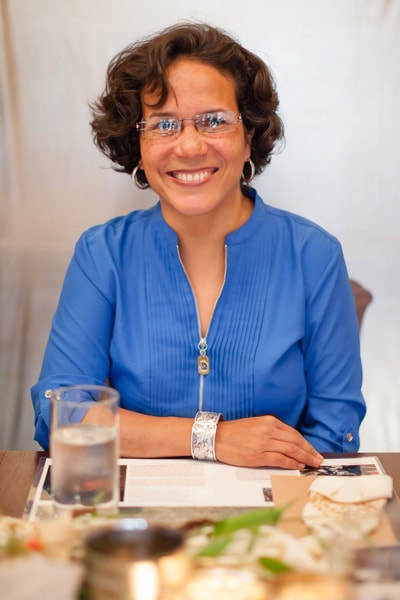 Lisseth Rojas-Flores: That’s right. When I first joined Fuller, at least as faculty, I took on a big job. I was stepping into the legacy of Judy Balswick, who had been at Fuller for over 20 years. It was hard fitting into her shoes as director of clinical training. The point is, I could never fit into those shoes: I was brand new to Fuller, a very new faculty member, I was Latina. I still am Latina! I just did not fit the mold in any way. For the students that were transitioning and had to deal with me right after Judy left, it was very strange. Some of them had difficulty reconciling.
Lisseth Rojas-Flores: That’s right. When I first joined Fuller, at least as faculty, I took on a big job. I was stepping into the legacy of Judy Balswick, who had been at Fuller for over 20 years. It was hard fitting into her shoes as director of clinical training. The point is, I could never fit into those shoes: I was brand new to Fuller, a very new faculty member, I was Latina. I still am Latina! I just did not fit the mold in any way. For the students that were transitioning and had to deal with me right after Judy left, it was very strange. Some of them had difficulty reconciling.
As time progressed, though, I felt more comfortable with my leadership position but there were some hard times finding my voice, being confident about my decisions, being confident about what I have to offer, and not feeling like I had to justify everything with my colleagues, with my students.
Every now and then I feel challenged, but I have developed a thicker skin, and I’ve been able to find my voice along the way.
Lauralee: Say a little bit more about finding your voice. What do you mean that that was hard, and at what point did it start to feel like, “Oh, now I get it. Now I know how to do this”?
Lisseth: Right. It’s interesting—for me it was not just being a woman. It was being a woman of color, a woman with an accent, an immigrant. Sometimes students would not treat me the same as they would treat other professors—especially male professors, obviously—and they would challenge things that I would say, both as a professor or as a director, whereas they would never have done that with a man. And I was young, too. I remember many times at graduations that parents would stop me and say, “Oh, so, when are you graduating?” I would respond, “No, I’m actually your daughter’s professor!” [pause] It still happens, every now and again!
[laughter]
Lauralee: That could feel complimentary, except that it comes along with something that probably we all have experienced, which is that undercurrent of having to fight to be taken seriously. You know it when it happens, right?
[Yes! Yes. Yes.]
Lauralee: When the air in the room changes and you know that this is about the fact that you’re a woman. I have that experience sometimes as a filmmaker, where I have to make a conscious decision who I am going to serve. Here’s an example: I’ll be asked to be on a panel or moderate an event or give a speech about being an artist of faith, and I know very well that I am asked because there aren’t any other women, no persons of color, no diversity at all. So I know that I am there to provide the diversity requirement.
[Mm‑hmm.]
Lauralee: Yet, I understand that it’s necessary to have intention. If we don’t, things aren’t going to change, but it just feels ookie in there, doesn’t it? Once I was at the Director’s Guild of America for a film screening and panel, and we were watching a film and one of the organizers saw me in the audience, came up to me in the middle of the film—that’s how late in the game it was—and said, “We’re going to have a panel afterward. Will you be willing to be on the panel?” I thought, “Oh, you don’t.”
[laughter]
Lauralee: I knew exactly what that was about. I thought, “Well, I can say no, because it feels humbling to me, possibly humiliating, or I can say yes because I know what it’s like to be a woman sitting in the audience and to see no female faces up there,”—right? Nobody in the audience is going to know what it feels like for me behind the scenes, but I’m going to say “yes” because I care about the young woman in that audience, looking up at a panel of young men and wondering, “Is there a place for me as a director?” At that event there wasn’t a chair for me. There wasn’t a bottle of water for me. There wasn’t a microphone for me. There were five guys comfortably ensconced, and me. Picture it: when I wanted to say something, I had to ask to borrow someone’s mic. Isn’t that perfect? I mean, just awfully perfect?
[laughter]
Lauralee: It’s everything you can do to contain how that makes you feel. And yet you have to keep your eyes on the prize. Mari—say something.
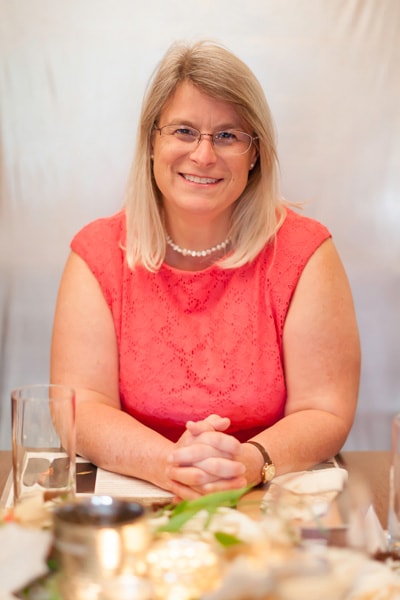 Mari Clements: There are many things about what you just said that totally resonated. It’s striking to me. I’ll start with a trivial one. My whole career I feel like I’ve been figuring this territory out— trying to decide “what is behind the decisions that are being made? Is that because of this, or is that because of that?”
Mari Clements: There are many things about what you just said that totally resonated. It’s striking to me. I’ll start with a trivial one. My whole career I feel like I’ve been figuring this territory out— trying to decide “what is behind the decisions that are being made? Is that because of this, or is that because of that?”
Lauralee: It’s exhausting, isn’t it?
Mari: It is. I went straight through from high school, to college, to grad school, to my first faculty job. Straight through. So I was not a lot older than my students. My first grad student actually was older than I was, which was difficult to negotiate.
At one point in my first year, I vividly recall asking a colleague whether he gets called Mr. rather than Dr. And he was shocked, asking “Why would anybody do that?” I thought, “Well, I get it a lot.” I still get it. I still get people calling me Mrs. Clements rather than Dr. Clements or Dean Clements. Your comment hit home about being the only woman on stage. But even though it’s not fair and I have been treated not well—I’m here and I need to do this, and do it well.
A lot of things happen, you’d be surprised, even from people I know, who know me and like me and respect my world. But sometimes things happen and I think, “you wouldn’t have done that to Winston [Gooden, previous dean, School of Psychology]. You wouldn’t have done that to Joel [Green, dean of the School of Theology], you wouldn’t have done that to Scott [Sunquist, dean of the School of Intercultural Studies].” What’s that about?
I’m also from the south which is actually a very big deal. We tend to be more tentative and I will ask “what do you think?” I will say, “can you please do this for me?” even if it’s in my rights to tell you to do this. It gets taken for weakness sometimes, and some people have counseled me that I need to do things differently, saying, “You really need to do such and such.” [long pause] Well, no I don’t think I do.
[laughter]
Lauralee: Or sometimes people will simply jump in and do it for you because your way of leadership makes them anxious. It’s not their dominant way, which is often dictatorial. They might perceive you as waffling, but it’s an intentionally different kind of leadership that actually takes quite a bit of ego strength.
Mari: That gets me back to the exhausting feeling of, “am I doing this right?” I called a meeting for Thrive Center which is a multimillion dollar research and outreach center. We’ve got the leadership team for next year shaping up to be all women and I called a meeting of these women, because I really felt the need to mark it for them, to say, “This is the first time that I’ve been in a leadership meeting that was all women.” It was different for all of us. For all the women in the room, it was the first time we’ve been in a leadership meeting that was all women. Can you imagine! As a result, the atmosphere changed, some of the normal rules didn’t apply, or we simply decided to work in a new way. It was very striking.
Lauralee: Any thoughts about that?
Julie: I’d like to respond. I don’t know if anybody else has experienced this: I’ve had difficulty working with men, but I’ve also had a lot of hardship working with women. Some of the conversations I’ve had with sisters have been the ones that have limited me the most. Even in a context where I felt, “this is our chance to band together and stand up and have our voice heard”—in those situations it was my sisters that silenced me. That hurts infinitely more to me than having that happen with men. I have to say to myself, “What am I fighting for if my own sisters are not standing behind me? Why do I even need to have my voice heard? I’m fighting for a cause that people don’t want!”
Lauralee: There’s an upside and a downside to one of the things women do well, which is work together in community. The downside is, we also know how to gang-up like nobody else does, am I right?
[murmurs of asset]
Lisseth: On the flipside, women at Fuller have been particularly supportive of me in so many ways and have mentored me in fabulous ways.
[murmurs of asset]
Lisseth: Many faculty, Linda Wagener when she was here, Mari, other colleagues to whom I can go and ask, “Could you tell me—is this right, why or not? Am I making this up?” Having some reality checks has been fantastic. A good number of female students have been absolutely fabulous as well. I remember particularly one day when I had been crying, I was in the bathroom and my face was beet red and I just felt like, “I don’t want to go out there. The students are going to see me.” I was headed out and trying to hide my face, and this African American student saw that I had been crying and she grabbed my hand, and she said, “Dr. Rojas-Flores! Lisseth! You remember, God is with you.” Oh, that was heart-breaking! It was amazing, so touching, what she said at that moment that was very powerful.
Women in the majority and also women of color, realize how hard it is to be in positions of leadership and they are willing to help.
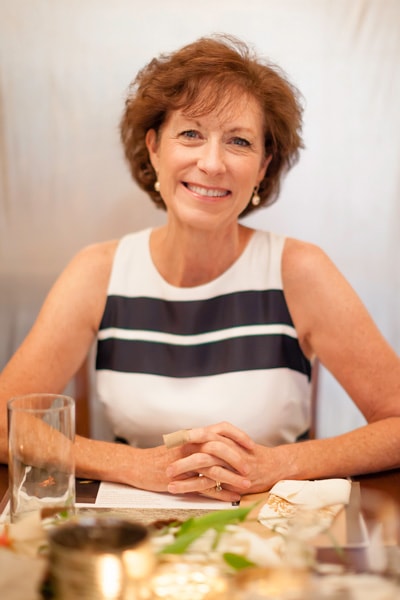 Meritt Sawyer: This may be the perfect time to introduce the very simple concept of our mothers.
Meritt Sawyer: This may be the perfect time to introduce the very simple concept of our mothers.
Mari: [jokingly] How about the complicated?
Lauralee: The complicated realities of our mothers! Oh, gosh, here we go.
[laughter]
Meritt: My mother’s generation was one where, for the most part, everyone was calm. Their identity, who they were, was very much centered in how they took care of the home and what kind of childhood they gave us. My mother was dedicated to giving me this extraordinary childhood. She invested her whole self in me, so when I did not affirm her life choices by going someplace different—it was one of the big struggles for me. I had very few people at the time affirm the way that I felt I needed to go. But I had a lot of voices, my mother in particular, that were not supportive of my not being full-time in the home. I got a lot of grief about all the sacrifices that I was going to make because I was not going to be giving the same kind of childhood to my kids that my mother had given to me. It was going to look different, and that scared me half to death.
There were some men who sat me down and said, “You are going to destroy your kids’ lives. You are making huge sacrifices,” and so many times throughout my life I would just hear those voices repeated in my head: “I am making the biggest mistake of my life. I am going to destroy my kids.”
These decisions that we make around life/work balance. When I was starting out in ministry it was at a time that there was a very well-known organization in this country that was promoting that women’s roles were to be full-time in the home and that was what women could do, and that’s what women should do. Anything else was not biblical.
It was difficult. There were people explaining that my choice to head up a nonprofit as a woman meant I was going to hell. I was just going to hell! I was having to work against that and having to work against my mom’s voice that said, “What do you mean you’re not cooking homemade lasagna for dinner tonight?”
Lauralee: Ironing your sheets.
Meritt: Yes! Ironing my sheets.
Audience member: I have never ironed my sheets in my life!
Meritt: One of the more extraordinary moments for me was continuing to hear these voices here in the United States whereas I had been heavily engaged in international ministry. I had just been to Kenya where I saw this woman who was called to ministry and she’s got her baby in a sheet on her back while she is out working in the field, and then going over to preach, and then going back to work. Someone made this really snarky comment to me about how I had just been to Kenya and I’ve abandoned my kids.
I had to think, “Wait a minute, the gospel that I know has to be true for every woman in every culture on this planet. Just because financially I could choose to stay home doesn’t mean that that is the answer for me.” In reality it was very affirming for me to have that kind of international experience and to be reminded that I can’t define life and ministry just by the American system.
Mari: I have to say that I think your daughter has turned out beautifully.
Meritt: She’s OK [gesturing to her daughter in the audience]. Thank you.
[laughter]
Marianne: You raise an interesting point. All the mentors in my professional life have been male. Either at Fuller or at grad school, there just weren’t women. There weren’t women at the time doing this. My mom worked outside the home from the time I was probably in third grade through to fourth grade, she was a teacher.
Mari: That is allowed. Teaching.
Marianne: That is allowed! She finished her bachelor of arts degree and then her master’s degree while we were growing up. When I got to high school she was still working on her master’s—I typed her papers.
Audience: Aw!
Marianne: It never occurred to me not to be a mom and work because that’s what my mother had done. Then you realize when you do it, “This is really hard.”
[laughter]
Marianne: The idea that you can have it all—it’s exhausting. Somebody pays the price. We’ve been very fortunate, John and I, by being professors together we have had a very flexible schedule. If between you, you had to work 8-6 or 7-6 day jobs, I don’t know how you would do it and have kids. I think it really depends on your life situation. I remember saying, “We just don’t have models for how this is done.” Back to your good point, Julie, I am hoping that it’s shifted now with your generation. We were definitely a part of, “You have to do it all,” because we weren’t at a place yet where men were really stepping up. They were learning, we were learning, we were trying to do it all. I think that’s what we could do for other women. Affirm whatever choice you make. It doesn’t have to be the same choice that I made. I hope that’s what we can do for women today.
Mari: That idea of “making it up as you go along” feels like my whole life!
[laughter]
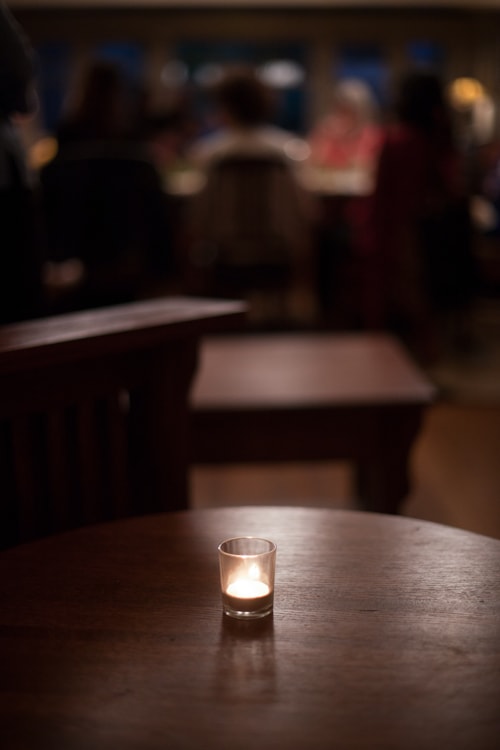 Mari: All of my mentors were men as well, and I was incredibly blessed and incredibly lucky to have the strangest set of circumstances happen. We had both of our kids while I was in graduate school—one in my third year of graduate school and one at the beginning of my internship year. [pause.] I don’t recommend that.
Mari: All of my mentors were men as well, and I was incredibly blessed and incredibly lucky to have the strangest set of circumstances happen. We had both of our kids while I was in graduate school—one in my third year of graduate school and one at the beginning of my internship year. [pause.] I don’t recommend that.
[laughter]
Jonathan was born early, he had all sorts of complications, he was in the hospital. Thank God I had an internship at Children’s Hospital in Denver—which was the 8th highest-rated children’s hospital in the world—because he spent some time there. When I got my faculty job at the end of my internship year and we went to Penn State, we did the math and figured that if Eric stayed home, it would effectively be a $10,000 raise.
Most of you don’t know my husband Eric. He worked in construction for 20 years, and he’s one of the least likely stay-at-home dads you can possibly imagine. Here’s a guy who spent his whole life on construction sites, and he decides that he’s going to stay home with the kids. He didn’t even change any of Matthew’s diapers. Ever.
[laughter]
Mari: So, Eric stayed home with Jonathan, but even then, somebody pays the cost. I was working 70-plus hours a week at Penn State, and Jonathan learned to walk without me being there. He said his first word without me being there. He got his first haircut without me being there. All of those moments are painful.
Here’s the one that I still [long pause] let’s see if I can get through saying it now. We were at home, outside on our sidewalk, and Jonathan was just learning to walk, and he fell down. I was as close to him as I am to Meritt right now, and Eric was all the way down the sidewalk, but Jonathan turned away from me and reached for his dad. I nearly died.
This same kid just yesterday was commissioned as a second lieutenant in the United States Air Force and wrote a beautiful piece of thanks to his parents for their unconditional support and love over the time of his life. When I heard it, I felt like “I did OK!”
[laughter]
Mari: Anyway, it was hard. It was a loss. The myth that you can have it all really is a myth. All decisions involve loss. It’s neither good nor bad. Every decision you make cuts off other decisions you might possibly make. The idea that those decisions should be made in advance for you because you happen to have two X chromosomes instead of one bugs me, but it is true that all decisions involve loss.
Lauralee: Every life involves loss. It would be hard to prove that making the choice in a different direction that there wouldn’t be anything other than . . .
Mari: . . . different loss.
Lauralee: Right.
Libbie: Can I bring it back to Fuller?
Lauralee: Ha! Yes, please.
Libbie: People thank me for my investment in Fuller, but I would say that the supporters for even the concept of women at Fuller—especially women getting an MDiv at Fuller—were all men, because it was men who were here.
In 1982, there was a long-range planning committee to establish ten-year goals for Fuller, and one of the questions was “what are the distinctives of the seminary.” We were asked in each of our departments to write what would be the distinctives and the goals for our little department.
Speaking of tokens, I was one of the few females on that committee. The person who was running it—a high-level person, who will go nameless—at every single one of those meetings “lost” the goals for the Office of Women’s Concerns. Every single time. It appeared as if I had not done my work. So, one breakfast meeting in 1982, I’ll never forget this, I was so ticked because he had done this yet again, so I was forced to say what our distinctives were verbally rather than have the handout. I was so mad that I ended up saying regarding the ten-year plan: “The current distinctives are that women are accepted in any degree program at Fuller, but the distinctive of Fuller should be that women are viewed as equal to men in all situations and can get any degree that they want.” That’s not it exactly, it was much more officialese. But that’s what I said.
[laughter]
Libbie: There’s this dead silence, and the first person who spoke was this scrawny little man, and I didn’t have the vaguest idea who he was at the time, though he was on the board then and became provost later. He said, “We need to pay attention to that.” The second person that spoke was David Hubbard, and he said, “That is who Fuller should be.”
Libbie Patterson, Fuller’s first Director of the Women’s Concerns Committee
I would like to say again, David Hubbard took really courageous stands at a time when Fuller was criticized—I mean, that was radical liberalism in the circle of evangelicals.
[laughter]
Libbie: It was only later when I started realizing that there were very few Offices of Women’s Concerns anywhere in the country. All of the other ones were Harvard and some of the liberal seminary institutions. People were shocked at Fuller, and shocked that I was there. On the other hand, I was so conservative compared to my colleagues at those other institutions. So, it’s what I’ve always said about Fuller: you should have bruises on both arms equally.
[laughter]
Libbie: So, in that 1982 meeting, everybody except the guy who kept losing our goals voted for the distinctives. That guy kept saying, “Are you sure you want to do this? Are you sure you want to do this?” but they voted for it unanimously—faculty, trustees, some others like me. It was a significant moment, but it wouldn’t have happened without the men who supported it. Really courageous men. David Hubbard took a lot of heat for what he did.
Lauralee: As is still the case, it requires all of us to intend—male and female. Intention is a big part of how change comes about. Sometimes it’s awkward and can feel false, like tokenism, but we have to intend change for it to happen. We all have inequities where fairness, or forgiveness even, is called for. But on the other side of that, there has to be the investigation of why is it important for female voices to be involved, and it goes way beyond fairness.
To put it broadly, if we have 100 percent of a community’s problems we are looking to solve, or potential that we are looking to flourish, but only half of that community is identifying the ways we might go about problem-solving or flourishing—do the math. We are only using half of our resources, we have half the chance of success.
I think that it’s important for us to realize that this is in the air we breathe, this is back to the memories that are held in this place, at Fuller. Let’s talk for a few minutes about why there is reason beyond fairness to have female voices in faculty, as trustees, as directors of clinical training, as students and preachers and graduates, and business persons, and worship leaders, and film directors. Thoughts about that?
Mari: There’s a book in the field of psychology that addresses the larger question of diversity, and the title of it is sort of like that: Even the Rat Was White. It’s about the early history of psychological research which was all conducted on white college-aged men.
Lauralee: Oh dear.
[laughter]
Mari: Yeah. Super representative sample. So much of what we know to be “true” is built from research and statistics from that era. For instance, how many of you have heard that marital satisfaction has a U‑shaped trajectory where you’re really happy and then you get less happy? That conclusion was drawn from retrospective reports of white Harvard College men. Retrospective. White. Young. Men. And not just any college, even, but Harvard!
[laughter]
Mari: Similarly, in psychopharmacological research, men and women don’t respond even cellularly the same way. To not include voices that are diverse is not only to cut off half of your problem solvers, but also not to understand the problems in the first place.
Mari Clements, Dean of the School of Psychology, and first female dean at Fuller
Marianne: Theologically speaking, it’s who we are as human beings. In the issue coming up one of the articles is something Joel Green and I did together on what is our understanding of women in ministry and how you figure that scripturally. The first thing we both said was that the creation account says we are created male and female together. In the image of God he created them male and female, he created them. Unless the whole “together” is included in everything, including in ministry, it’s not the whole human race.
I can remember, must have been early in my teaching career maybe 1986 or ’87. The Council for Biblical Manhood and Womanhood came out with a statement that came to be called “the Danvers Statement.” We had a colloquium to a packed room responding to that thing. At the end I remember David Hubbard summing it up and saying, “Whereas the Danvers Statement is all hierarchy, hierarchy, hierarchy—at Fuller we’re all about mutuality, mutuality, mutuality.” That’s Fuller.
The other reason it’s important to have women’s voices is simply that women have different experiences than men. We socialize differently. We have different experiences of the world because of our bodies and who we are. That needs to be taken into account, too.
Meritt: Even within the area of international economic development, research shows that it’s the women who typically take care of the children, while the men—I don’t want to put a negative spin on this or start demonizing men here, I am just reflecting what the statistics show—a lot of time they will be drinking at the bar downtown. We see more productivity as an organization when we invest in women who take care of the kids and the family.
These may be gross generalizations, but there is research that does demonstrate that. In order to care for all of God’s creation, and to care for all of our population, we need to recognize the unique role that women play in the community—not just men.
Lisseth: For me, particularly as a Latino woman coming to Fuller, I almost felt like I was called to be here “for a time such as this” because of the change of demographics in the United States. How the Latino community is rising and we need more role models. In particular, we need to see powerful women who can have a voice, who can have healthy marriages, who can have healthy kids who are proud and who are thriving. It’s extremely important.
To have models for our students as well, who are coming from different ethnic backgrounds to whom I can say, “Yes, we can be there. Yes, we can lead. There’s no shame, and you have a lot to offer.”
Lisseth Rojas-Flores, Associate Professor of Marriage and Family Therapy
I do see that as being very important with my students. I see my role as that person who is saying, “You can do it! You can do it! Come on! Wrestle with your ghosts. Wrestle with your minority complex because you have so much to offer!”
I have a colleague, who I love dearly, and she’s always saying to me, “You know Lisseth, if you want to highlight a problem, you better make sure you’re part of the solution.” That helps me think about what, as a Latino woman, I can contribute to Fuller and why we need more women of color bringing different perspectives, and challenging and breaking molds.
Lauralee: I’m interested to hear from both of you, as students, what your thought are.
Leah: Speaking directly to preaching, women see things in the text that men may miss. In my experience, people tend to think of me as a passionate preacher. I tend to draw out the emotion in the text and the characters that I highlight. If we’re focusing only on men, and if only men can speak, then there is an aspect of even men that men can’t address. Marianne was talking about the pair of men and women, and it is man and woman together that are able to reach the totality of the human experience. As a woman, I can speak to something in men that another man can’t speak to, and as a woman, I can speak to something in women that another man can’t speak to. It is the opposite as well that, men can speak into women, men can speak into men, but together we can speak into each other in the most full way.
Leah Fortson, peer clinical PhD psychology student and preacher
Lauralee: Well put. You were nodding vigorously over here, Julie.
Julie: The women at this table are evidence of the things that I believe in. You have given our generation hope to do what we’re doing now. The need for women in leadership comes, for me, in looking behind me and at the young people that I get to work with, young girls. I brave it, and I stand up against the ridicule, and the, “I hate your squeaky voice,” thing and I sing anyways, because I want to make sure that I give hope for the coming generation. I give them a chance to dream and an opportunity to know that they’re more than their reproductive parts, that they’re more than just the body that they have, more than just a wife, and that’s it.
I know these are things that you’ve combated in your generation and unfortunately they are still things we have to talk about right now, things I have to talk about with the young girls I work with. We have to continue in this journey because we have to give them an opportunity to dream and an opportunity to have hope. That, for me, is worth it.
I have to thank you all who have pioneered ahead of me because I know that even coming to Fuller and being able to lead worship, and being able to write music, and sing, and lead is because you guys fought the war ahead. I commend you, women at this table, I thank you and I know that I have a job to do for the women that are coming behind me and after me.
Lauralee: I think that’s what role modeling is—not that we are doing everything perfectly so that people can mimic us. It is a way of saying, “I am willing to be out in front and whatever comes at you to hurt you has got to go through me first.” That I can make a commitment to do.
I’d like to sing the doxology together as a way of closing out and invite all of our watchers and listeners, but before I do that though, [gesturing to Mary Hubbard Given, daughter of David Allan Hubbard, sitting in the audience] to you have a thought or a comment you would like to make?
Mary Hubbard Given, Vice President for Alumni and Church Relations: I’m delighted to be here. I have struggled with a lot of the things that you all have struggled with, but because my grandmother and my aunt were pastors back in the ’20s, my experience of women is different. I love hearing all of your stories. My dad, when he retired in 1993, said that he was still having to talk about equality for women, and he really was done with it. When I came back here in ’08, the thing that surprised me the very most was that we were still talking about this. My husband was a PhD student in the school of psychology from ’77 to ’83, so we were here those years as students. When I came back in ’08, I was just stunned that we were still talking about it. So that was really disappointing to me, and now as we are still talking about it, in some way it seems worse. I grew up in a very privileged home. My dad would be very sad that our women and our men students are still struggling with this issue.
Lauralee: We are institutionally your father’s children, too, so we have the privilege of hearing at this table so many saying “My experience at Fuller has been one of being affirmed, one of having open arms and respect.”
Libbie: When I was doing Women’s Concern but also after that as I moved through the system and other jobs I would feel pretty passionate that Fuller is a unique place. If people are saying that they are feeling affirmed and not scared, then I think we’ve done it. For many women it requires liberating them from, “Do I dare take a class?” to, “Preach it, sister!” [laughter]
Libbie: It’s a path. I’ve always fought for that, for Fuller.
Lauralee: Thank you for doing so.
Lisseth: Can I just add something to that? Being a woman and being a mother too, I think for me, it’s been very rewarding. My kids hang around Fuller, they know everybody in all of the School of Psychology. They think my office is their office. That is an important message to send to the students.
I remember in the early years when my daughter was two-and-a-half years old, they got a call from the daycare that she was having a stomachache. “Dear God,” I thought. “I have to teach a class in 15 minutes!” I couldn’t find a replacement, so I went and picked her up, and brought her to the classroom. My poor baby was having diarrhea. I’m trying to teach and my daughter is like, “I have to go to the bathroom!” [laughter]
Lisseth: That was the most intense, crazy class I ever had. I was going back and forth. I assigned things to the students to do, while I went with my daughter to the bathroom. I could see a couple of students giggling, because they knew what was happening. They were mothers. Afterwards they came and say, “Thank you for bringing your child. I can do this. I don’t have to be perfect. I just have to be me, a mother, who can teach, who can bring their kids. Whether they have diarrhea or not, it’s a good thing.”
It’s a struggle. It’s hard to find ways where I can bring my family into the life of Fuller. It’s a struggle, but I have to say, relative to other places I’ve been, it’s been wonderful to bring in my family and for them to feel that this is where they belong as well. Especially my two girls.
Lauralee: They’ll grow up without question of whether or not they are allowed, whether they’re invited, or whether it’s OK for them. In some ways I think what we’re saying is, there’s just generations worth of trying to make change in the right direction. Hopefully that continues to happen here.
Libbie: Next year is, if you look at the Office of Women’s Concerns, being a sort of marker, the 40th year of women at Fuller. I jolly well hope you all do something. [laughter]
Mari: I will work on that. [murmurs of assent]
Lauralee: Any other comments before we go? Lovely Voice Julie, will you give us a note to sing the Doxology together?
Female Participant: Sure.
Lauralee: Everyone can join in in singing. [to Julie] Feel free to pick a woman‑happy key. [laughter]
Lauralee: Let’s all sing together.
Congregation: Praise God from whom all blessings flow. Praise God all creatures here below. Praise God above ye heavenly host. Praise Father, Son, and Holy Ghost. Amen.
Lauralee: So be it. Thank you. Thank you for coming.
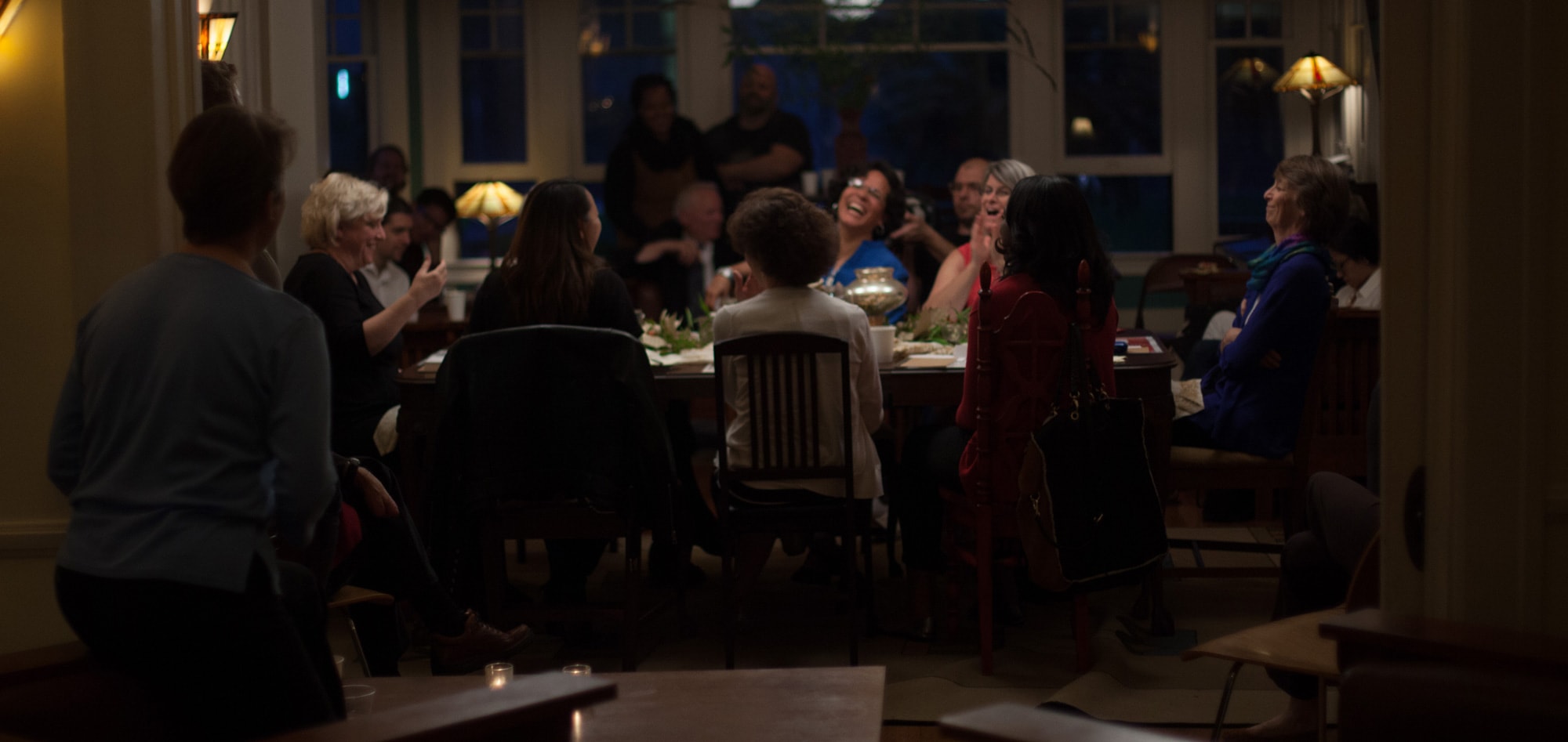
+ Still photography by Nate Harrison and Brandon J. Hook.

+ The Story Table takes a theme from FULLER magazine and brings it to life at everyone’s favorite conversation place: the dinner table. People who embody the theme in unique ways tell their stories around the table, and members of the community are invited to listen in. If you are interested in hosting your own Story Table, we’ve prepared a guide that you might find helpful. Download our Story Table Guide. Explore other Story Tables here.
